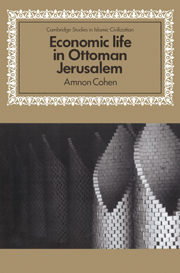Book contents
- Frontmatter
- Contents
- List of illustrations
- Note on transcription
- Map1
- Introduction
- 1 Butchers and meat consumption
- 2 Soap production and olive oil
- 3 Flour and bread
- Conclusion
- Note on abbreviations
- Note on weights, measures and monetary values
- Appendix 1 Meat prices in Jerusalem
- Appendix 2 Olive oil and soap prices in Jerusalem
- Appendix 3 Flour and bread prices in Jerusalem
- Appendix 4 A soap-factory in Jerusalem
- Notes
- Bibliography
- Subject index
- Geographical index
- Index of personal names
3 - Flour and bread
Published online by Cambridge University Press: 10 November 2010
- Frontmatter
- Contents
- List of illustrations
- Note on transcription
- Map1
- Introduction
- 1 Butchers and meat consumption
- 2 Soap production and olive oil
- 3 Flour and bread
- Conclusion
- Note on abbreviations
- Note on weights, measures and monetary values
- Appendix 1 Meat prices in Jerusalem
- Appendix 2 Olive oil and soap prices in Jerusalem
- Appendix 3 Flour and bread prices in Jerusalem
- Appendix 4 A soap-factory in Jerusalem
- Notes
- Bibliography
- Subject index
- Geographical index
- Index of personal names
Summary
[…] the Lord had visited his people in giving them bread.
[…] and they came to Bethlehem in the beginning of barley harvest.
And she went and came and gleaned in the field after the reapers.
(Ruth I, 6; 1, 22; II, 3.)Division of labor: millers and bakers
Important as meat and olive oil were in the daily diet of Jerusalemites, for the majority of the population bread was the most essential staple. The demand for meat was curbed to some extent by its relatively high price. Olive oil was cheaper, easier to procure and store and, as we have seen, was very widely used. Bread, however, was the major source of calories and other nutritional elements for all social strata. Due to its lower price, in its various forms it tops the list of foodstuffs consumed in sixteenth-century Jerusalem; it was readily available and production and supply were quite dependable. To encourage the town's merchants to engage in the economic activities involved in bread-making and in order to keep the price down, grains imported for bread were tax-exempt. The kanunname of Jerusalem which set the rates for the various taxes to be levied on goods imported to the town specifically stated: “from wheat nothing shall be levied.” Although barley was not mentioned, one may assume that by the same logic, it too was tax-free.
- Type
- Chapter
- Information
- Economic Life in Ottoman Jerusalem , pp. 98 - 118Publisher: Cambridge University PressPrint publication year: 1989

